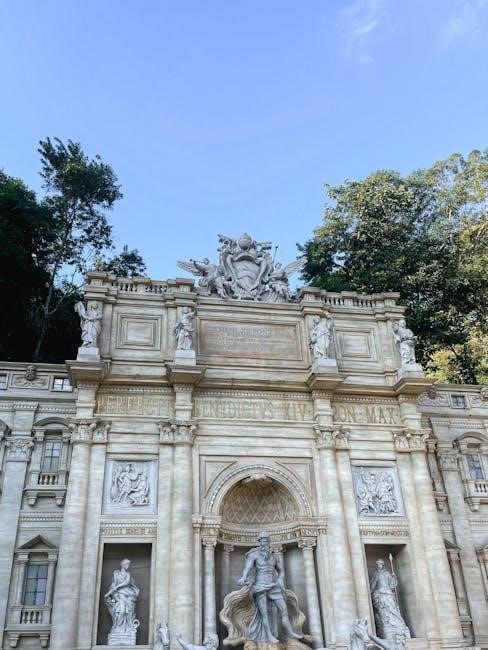Plot Summary of “The Alchemist”
The Alchemist by Paulo Coelho follows Santiago, a young shepherd, on a journey driven by recurring dreams of treasure, encountering mentors who teach him about destiny and spirituality, leading to self-discovery.
1.1. The Journey of Santiago
Santiago, a young Andalusian shepherd, embarks on a transformative journey driven by recurring dreams of treasure near the Egyptian pyramids. His travels take him from Spain to Africa, where he meets a gypsy woman, a mysterious stranger, and an Englishman seeking an alchemist. These encounters guide him toward understanding the Soul of the World and his Personal Legend. Along the way, he learns to interpret omens, trust the universe, and embrace the simplicity of life, undergoing profound personal and spiritual growth.
1.2. The Recurring Dream and the Quest for Treasure
Santiago’s journey begins with a recurring dream of finding treasure near the Egyptian pyramids. A gypsy woman interprets the dream, convincing him to pursue it. He sells his sheep and sets off, facing initial setbacks like theft. Undeterred, he joins a caravan to cross the desert, meeting an Englishman seeking an alchemist. The dream becomes a catalyst for his spiritual and personal growth, guiding him toward his Personal Legend and the universal truths hidden within his heart.
1.3. Key Plot Twists and Turning Points
Santiago’s decision to pursue his recurring dream sparks his journey. A gypsy’s interpretation and the theft of his money in Tangier are pivotal, teaching him resilience. Meeting the crystal merchant and later the Englishman introduces him to alchemy’s principles. The alchemist’s guidance in the desert and Santiago’s near-death experience at an oasis are turning points. Ultimately, he realizes the treasure was within him all along, symbolizing spiritual growth and self-discovery, fulfilling his Personal Legend in an unexpected way.
Major Themes in “The Alchemist”
The novel explores themes of destiny, spirituality, and universal wisdom, emphasizing the importance of listening to one’s heart and trusting the universe’s plan for self-discovery.
2.1. The Concept of Destiny and Personal Legend
In The Alchemist, the concept of destiny, or “Personal Legend,” is central to Santiago’s journey. It refers to the unique path each individual is meant to follow to fulfill their life’s purpose. Santiago’s recurring dream of treasure symbolizes his Personal Legend, guiding him toward self-discovery and spiritual enlightenment. The novel emphasizes that destiny is not random but is intertwined with the universe’s plan, urging individuals to listen to their hearts and trust in the signs that lead them to their true calling. Fulfilling one’s Personal Legend requires courage, faith, and surrender to the journey.

2.2. Spirituality and Universal Wisdom
The Alchemist is deeply rooted in spirituality, emphasizing the interconnectedness of all things. Santiago’s journey highlights the universe’s language, where omens and signs guide individuals toward their destiny. The novel explores universal wisdom, suggesting that spiritual truths transcend religions and cultures. Alchemy serves as a metaphor for spiritual transformation, where base metals represent the soul’s raw state, and gold symbolizes enlightenment. Through Santiago’s experiences, Coelho illustrates that true wisdom lies in understanding the universe’s harmony and listening to the heart, which connects us to the divine.

2.3. The Importance of Listening to One’s Heart
The Alchemist underscores the importance of listening to one’s heart, which serves as a guide to fulfill life’s purpose. Santiago learns to trust his intuition, as his heart reveals truths beyond logic. By embracing this inner wisdom, he navigates challenges and discovers his destiny. The novel teaches that the heart is a source of universal wisdom, aligning with the soul’s desires. Coelho emphasizes that true fulfillment comes from following the heart’s whispers, which lead to self-discovery and harmony with the world.

Author Background and Writing Process
Paulo Coelho, a Brazilian author, completed The Alchemist in just two weeks, driven by his belief that the story was already written in his soul, reflecting his spiritual and philosophical insights.
3.1. Paulo Coelho’s Inspiration for the Novel
Paulo Coelho’s inspiration for The Alchemist stemmed from his deep spiritual journey and fascination with mysticism. He drew from universal truths, mythology, and the concept of “Personal Legend,” reflecting his belief in destiny. The idea of transforming base metals into gold symbolized the alchemy of the soul. Coelho’s own life experiences and philosophical reflections were woven into the narrative, creating a timeless fable that resonates with readers worldwide. His inspiration was intuitive, as he often stated, “The book was already written in my soul.”
3.2. The Remarkable Two-Week Writing Period
Paulo Coelho wrote The Alchemist in just two weeks, a testament to his creative flow; He believed the story was already complete within him, needing only to be transcribed. This brief period reflects his spiritual belief that the universe conspired to bring the book to life. Despite initial slow sales, the novel’s profound message and simple prose captivated readers, propelling it to global success. Coelho’s concise writing mirrors the book’s themes of clarity and purpose, proving that inspiration can unfold swiftly when aligned with one’s soul.
3.3. Initial Reception and eventual Success
3.3. Initial Reception and Eventual Success
The Alchemist initially faced slow sales after its 1988 release but gained momentum through word of mouth. Its universal themes resonated globally, leading to over 150 million copies sold in 80 languages. This made it a global phenomenon and a bestseller, solidifying its place in modern literature.

Key Characters and Their Roles
Santiago, a young shepherd, embarks on a journey of self-discovery. The Alchemist serves as his spiritual guide, while other characters like Melchizedek and Fatima influence his path.
4.1. Santiago: The Protagonist’s Transformation
Santiago, an Andalusian shepherd, evolves from a curious boy driven by recurring dreams to a man who embraces his destiny. His journey begins with a recurring vision of treasure near the Egyptian pyramids, leading him to leave his familiar life. Along the way, he faces challenges and meets influential figures like the Alchemist and Melchizedek, who teach him about the Soul of the World and the Language of the Heart. Santiago’s transformation is marked by his growth from fear and doubt to courage and self-discovery, ultimately realizing his Personal Legend.
4.2. The Alchemist: Mentor and Guide
The Alchemist serves as a wise mentor to Santiago, teaching him the art of alchemy and the deeper truths of life. With his vast knowledge and spiritual insight, he guides Santiago to understand the Soul of the World and the interconnectedness of all things. The Alchemist encourages Santiago to trust in the universe and listen to his heart, helping him decipher the Language of the World. Through his wisdom and unwavering belief in Santiago’s potential, the Alchemist becomes a pivotal figure in Santiago’s journey toward fulfilling his Personal Legend.
4.3. Other Influential Figures in Santiago’s Life

Beyond the Alchemist, Santiago encounters several influential figures who shape his journey. Melchizedek, the mysterious king, introduces him to the concept of a Personal Legend, inspiring his quest. The gypsy woman interprets his recurring dream, setting his journey in motion. Fatima, the desert woman, teaches Santiago about the power of love and spirituality. Each figure imparts wisdom, guiding him toward self-discovery and the fulfillment of his destiny, while emphasizing the interconnectedness of all experiences in life.

Cultural and Symbolic Elements
The novel richly incorporates cultural and symbolic elements, such as the desert as a metaphor for life’s journey and alchemy as a symbol of spiritual transformation and self-discovery.

5.1. The Symbolism of Alchemy in the Novel
Alchemy in The Alchemist symbolizes the transformation of the soul. It represents the process of self-discovery and spiritual growth, where base metals signify raw human potential, and gold embodies enlightenment. The alchemist’s pursuit of turning lead into gold mirrors Santiago’s journey from innocence to wisdom. This metaphor underscores the idea that true alchemy occurs within, transforming one’s life through courage, faith, and understanding the universe’s language. Coelho uses alchemy to illustrate that spiritual wealth surpasses material riches.
5.2. The Desert as a Metaphor for Life’s Journey
The desert in The Alchemist serves as a powerful metaphor for life’s challenges and transitions. Its harsh conditions symbolize the trials and uncertainties we face, while its vastness reflects the endless possibilities and the unknown. Santiago’s journey through the desert teaches him resilience, trust in the universe, and the importance of listening to his heart. The desert’s emptiness paradoxically fills him with spiritual richness, emphasizing that true growth often occurs in the most desolate and unexpected places, where one must rely on inner strength and faith to navigate.
5.3. The Prologue and the Story of Narcissus
The prologue introduces the story of Narcissus, a youth who drowns while admiring his reflection, symbolizing self-obsession. The goddess of the forest mourns, but the lake reveals it weeps not for Narcissus’s beauty, but for its own inability to reflect the stars. This parable warns against vanity and the distraction of material allure, aligning with the novel’s themes of self-discovery and spiritual awakening. It sets the tone for Santiago’s journey, emphasizing the importance of looking beyond superficiality to find true meaning and purpose.

The Book’s Impact and Legacy
The Alchemist has sold over 65 million copies, translated into 80 languages, becoming a global phenomenon and modern classic, inspiring millions with its timeless wisdom.
6.1. Sales and Translations: A Global Phenomenon
The Alchemist has achieved unparalleled success, selling over 65 million copies worldwide and being translated into more than 80 languages. This global phenomenon began modestly but gained momentum, resonating with readers across cultures. Its universal themes of destiny and spirituality transcended language barriers, making it a bestseller in nearly every country. Notable translations include Arabic, Chinese, and Russian, further cementing its global appeal. This widespread reach solidified its status as a modern classic, inspiring millions and leaving an indelible mark on world literature.
6.2. Reader Responses and Interpretations
The Alchemist has sparked profound reader responses worldwide, with many describing it as a life-changing read. Readers resonate with its themes of self-discovery and spirituality, often interpreting Santiago’s journey as a metaphor for their own lives. The novel’s simplicity and depth have made it accessible to diverse audiences, fostering personal reflections on destiny and purpose. Its universal appeal has led to countless interpretations, with readers from different cultures and backgrounds finding unique meaning in its timeless wisdom. This collective resonance underscores its enduring impact on global readership.
6.3. The Alchemist’s Place in Modern Literature
The Alchemist holds a significant place in modern literature as a timeless fable of self-discovery and spirituality. Its universal themes of destiny and personal growth resonate globally, transcending cultural boundaries. Coelho’s simple yet profound writing style has made it accessible to a wide audience, cementing its status as a modern classic. The novel’s influence extends beyond literature, inspiring countless readers and authors, and remains a cornerstone of contemporary inspirational and philosophical writing, continuing to captivate readers with its enduring message of hope and transformation.
